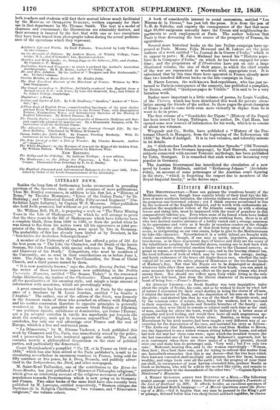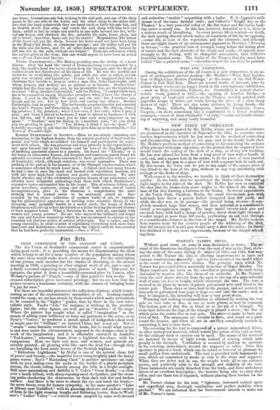rittrorg eltgaings.
THE MenrroemAreas.n.—None can gainsay the wondrous beauty of the Mediterranean, nor, though hues equally lovely of their kind dye the bil- lows of more northern latitudes, the extreme richness and changeableness of its gorgeous sun-borrowed colours ; yet I think anyone aocustomed to live by the seaboard of the English Channel, and to watch with enthusiastic ad- miration the magnificent rollers of the Atlantic coming in with a stirring breeze and rising tide, must be impressed with the want of grandeur in this comparatively tideless sea. Even when some of its famed winds have lashed the usually silver and lapis lazuli surface into seething foam, there is to all who love natural marine pictures of a boldly varied cast a strange sameness in its appearance and voice as it breaks in ceaseless crashes on the shingle ridges ; while the utter absence of that fresh briny odour of the veritable ocean, so invigorating on our own coasts, helps to give to the Mediterranean its lake-like character. Nevertheless it is a noble inland sea fraught with classic associations, though, if one may so speak, impulsive, passionate, treacherous, as in these degenerate days of Greece and Italy are too many of the inhabitants peopling its beautiful shores, causing one to look back with a fonder and more reverential emotion than ever to the Channel scenery, so grand in repose, so terrible in tempest—ay; and to the bracing climate too, the local influence of both of which may be traced in the energy, daring, and hardy endurance of the brave old Anglo-Saxon race, whether the indi- vidual lot be cast on the sultry plains of Hindoatan or the ice-bound banks of Hudson's Bay. Not that the Biqa are to be disparaged or despised : wherever hills other than mere mounds rear their heads, you can mark in some measure their mind-elevating effect on the men and women who dwell among them. Nor should one reflect upon Italy while living in the only part of her fair land, that from the liberal character of its sovereign can boast of being free.—Fraser's Magazine.
AN AFRICAN LEGMs'IL—As Seedi Bombay was very inquisitive today about the origin of Seedis, his caste, and as he wished to know by what law of nature I accounted for their cruel destiny in being the slaves of all men, I related the history of Noah, and the disposition of his sons on the face of the globe ; and showed him that he was of the black or Hametic stock, and by the common order of nature, they, being the weakest, had to succumb to their superiors, the Japhetic and Semitic branches of the family ; and, moreover, they were likely to remain so subject until such time as the state of man, soaring far above the beast, would be imbued by a better sense of sympathy and good feeling, and would then leave all such ungenerous ap- pliances of superior force to the brute alone. Bombay, on being created a Mussulman by his Arab master, had been taught a very different way of ac- counting for the degradation of his race, and narrated. his story as follows : " The Arabs say that Mahomet, whilst on the mad from Medina to Mecca, one day happened to see a widow woman sitting before her house, and asked her how she and her three sons were; upon which the troubled woman (for she had concealed one of her sons on seeing Mahomet's approach, lest he as is customary when there are three males of a family present, should seize one and make him do porterage) said, ' Very well ; but r ye only two sons.' Mehemet, hearing this, said to the woman reprovingly : 'Woman, thou Hest ; thou hast three sons, and for trying to conceal this matter from me, henceforth remember that this is my decree—that the two boys which thou haat not concealed shall multiply and prosper, have fair faces, become wealthy, and reign lords over all the earth ; but the progeny of your third son shall, in consequence of your having concealed him, produce Seedis as black as darkness, who will be sold in the market like cattle, and remain in perpetual servitude to the deseendants of the other two.' "—Captain Spoke in Blackwood's Magazine.
A MERRY QUESTION ANENT THE BURNING- OF A MILL.—The following quaint passage ooeurs in Sir James Balfour of Pettindreich's .Praerieks of the Law of Scotland (p. 509). It affords besides an excellent specimen of the old Lowland Scotch language Merrie Questioun anent'the Burn, ing of a Miln.—Gif it ha pin that ony man be passand in the King's gait or passage, drivand befoir him twa sheip festnit and knit togidder, be chance ane horse, havand ane sair bak, is lying in the said gait, and ane of the sheip passis be the ane side of the horse, and the uther sheip be the other side, awn that the band qubairwith they are band tuich or kittle his saes bal, and he thairby movit dois arise, and caryis the said sheip with him heir and their, main at last he minus and enteral in ane miln havand ane fire, with- out sue keipar and slattteris the fire, quhairby the miln, horse, sheip, and all is brunt ; Qunritur, Quha sail pay the skaith ? Respondetur, The awner of the horse sail pay the sheip, because his horse sould not have been lying in the ring's his streit, or commoun passage • and the miller sail pay for the miln and the horse, and for all uther damnage and skaith, because he left ane fire in the miln without ane keipar." From the references which the author gives at the close, this ease would appear to have been an actual one.—Froni Notes and Queries.
PETER CARTWRIGET.—The Bishop presiding was the victim of a heart disease. Over his head the sword of Damocles hung ever suspended by a hair, the death's head was never absent from his banquet, and the dread of sudden death had discoloured all his ideas of life. He was the morbid and sworn foe to everything like gaiety, and while not sour or sullen, yet his piety was weighty and lugubrious. It may well be imagined that such a chairman had trouble to keep in order a man like Peter Cartwright, with whom humour and drollery are as natural as to breathe. Brother Cart- wright had the floor one day, and, by his irresistible fun, set the Conference in a roar. "Stop, Brother Cartwright," said the Bishop, "I cannotallow such sin to be committed among Methodist preachers when I have the charge of them. I read in the Bible, ' Be angry and sin not ;' but I nowhere see, Laugh and sin not. Let us bow down and confess our offence. Brother Cartwright, lead in prayer." The backwoods preacher kneeled and repeated the Lord's Prayer, and then rising, said, " Look here, Mr. Bishop, when I dig potatoes, I dig potatoes ' - when I hoe corn, I hoe corn ; when I pray, I pray ; and when I attend to business, I want to attend to business—I wish you did too, and I don't want you to take such snap judgment on me again." " Brother," said the Bishop in a monitory tone, " do you think you are growing in grace ? " " Yes, Bishop, I think I am—in spots." It is hardly necessary to add that the Bishop gave him up as incorrigible.—Tint Years of Preacher-Life.
ROBERT STEPHENSON DT SOC/Eri.—Here he was simply charming and fascinating in the highest degree, from his natural goodness of heart and the genial zest with which he relished life himself and participated its enjoy- ment with others. He was generous and even princely in his expenditure— not upon himself but on his friends—and his love of the English pastime of yachting amounted almost to a passion. On board the " Titania," or at his house in Gloucester Square, his frequent and numerous guests found his splendid resources at all tames converted to their gratification with a grace of hospitality which, although sedulous, was never oppressive. There was nothing of the patron in his manner, or of the Olympic condescension which is sometimes affected by much lesser men. A friend (and how many friends he had !) was at once his equal- and treated with republican freedom, yet with the most high-bred courtesy and gentle considerateness. We may doubt whether any of the celebrated reception houses of our aristocracy ever afforded more delightful gatherings than those with which Stephenson's expansive tastes surrounded him in his home. Men of science, letters, art, great travellers, engineers, young and old of both sexes, and of varied accomplishments, gave to his reunions a completeness the more striking that it seemed never to be anxiously aimed at. Sur- rounded by his choice collection of modern works of art, or explain- ing his philosophical apparatus, or battling some scientific thesis, or ex- changing some sprightly banter in a social circle, the image of Robert Stephenson will rise up before his friends as a pillar bearing the record of some of their happiest hours. What a favourite he was with all, especially with women and young persons ! No one who enjoyed his intimacy can forget the easy and familiar manner in which he was accustomed to enlarge on in- teresting but abstruse points of natural philosophy. But to ladies, and the young especially, he made a point of explaining everything with more than usual care and definiteness, never quitting the subject until he was satisfied that he had been perfectly understood.—Once a Week.



































 Previous page
Previous page